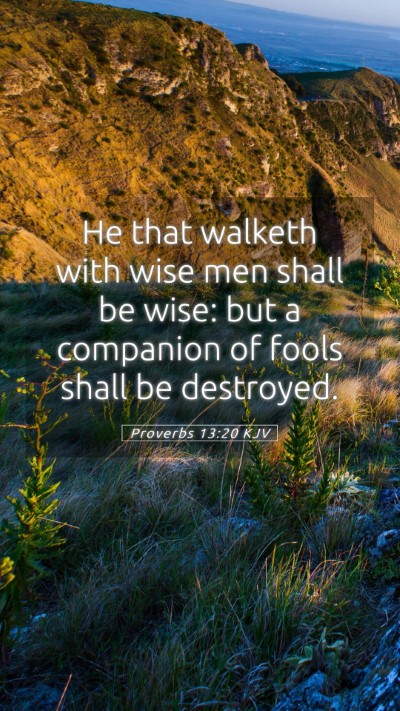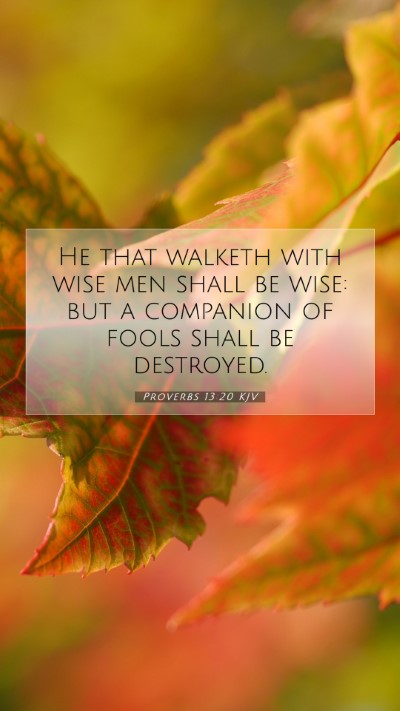Understanding Proverbs 13:20
The verse Proverbs 13:20 states, "He who walks with wise men will be wise, but the companion of fools will be destroyed." This scripture highlights the importance of choosing one’s associates carefully and the impact of such choices on personal wisdom and success.
Summary of Bible Verse Interpretations
This verse emphasizes that the company one keeps can greatly influence their life path and outcomes. Here’s a detailed exploration of its meaning:
Insights from Matthew Henry’s Commentary
Matthew Henry suggests that walking with wise people not only imparts knowledge but also encourages wise behavior. Those who associate themselves with wise individuals are likely to benefit from their intelligence, experience, and moral character. Conversely, spending time with foolish individuals can lead to ruin. Wisdom, in this context, can be understood as both practical knowledge and moral integrity.
Insights from Albert Barnes’ Commentary
Albert Barnes elaborates that the 'wise men' in this verse refer to those who are knowledgeable and virtuous, whereas 'fools' are those who lack insight and wisdom. Barnes points out the social aspect of wisdom; that is, wisdom often requires an environment that fosters learning and accountability. Surrounding oneself with wise people instills a sense of responsibility and enhances personal growth through mutual encouragement.
Insights from Adam Clarke’s Commentary
According to Adam Clarke, the verse serves as a warning. He emphasizes that foolishness is infectious; associating with foolish people can lead one down a path of destruction. Clarke argues for the necessity of discernment in friendships and the potential consequences of neglecting to maintain wise companionship.
In-Depth Analysis of Proverbs 13:20
When analyzing this verse further, one can draw several key themes and applications:
- The Principle of Influence: Our associations profoundly impact our actions and choices, urging believers to engage in Bible study insights that explore the dynamics of relationships.
- Encouragement for Community: This verse supports the idea of community in Bible study groups, where individuals can grow in wisdom collectively.
- Practical Application: Understanding this verse can guide individuals in making wise decisions about whom they choose to spend their time with, aligning with Bible study principles.
- Character Development: Proverbs 13:20 implies that wisdom is not just a solitary journey but is often cultivated within the context of healthy relationships.
- Protection against Destruction: The dangers of folly serve as a sobering reminder to avoid negative influences that could lead to devastating consequences.
Application of Proverbs 13:20 in Daily Life
Applying this verse involves more than just reflection; it calls for action in one’s social interactions:
- Choose Friends Wisely: Evaluate the character of those you surround yourself with. Engage in discussions about how to interpret Bible verses in light of your personal associations.
- Seek Knowledgeable Guidance: Connect with individuals who challenge you intellectually and spiritually—those who contribute positively to your Bible study lessons.
- Participate in Supportive Networks: Join Bible study resources like online forums or in-person groups that stimulate wise conversation and learning.
Cross References for Further Study
Several other Bible passages resonate with the themes found in Proverbs 13:20:
- Proverbs 1:10 - "My son, if sinners entice you, do not yield to them."
- 1 Corinthians 15:33 - "Do not be deceived: ‘Bad company corrupts good morals.’"
- Proverbs 12:26 - "The righteous choose their friends carefully, but the way of the wicked leads them astray."
Conclusion
Proverbs 13:20 serves as a timeless reminder of the profound influence our relationships can have on our lives. By choosing to walk with the wise and avoiding the company of the foolish, we can cultivate a path towards wisdom and moral integrity. This verse encourages Bible study insights that lead to a deeper understanding of our social environments and their impact on our spiritual journeys.


